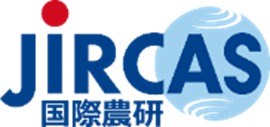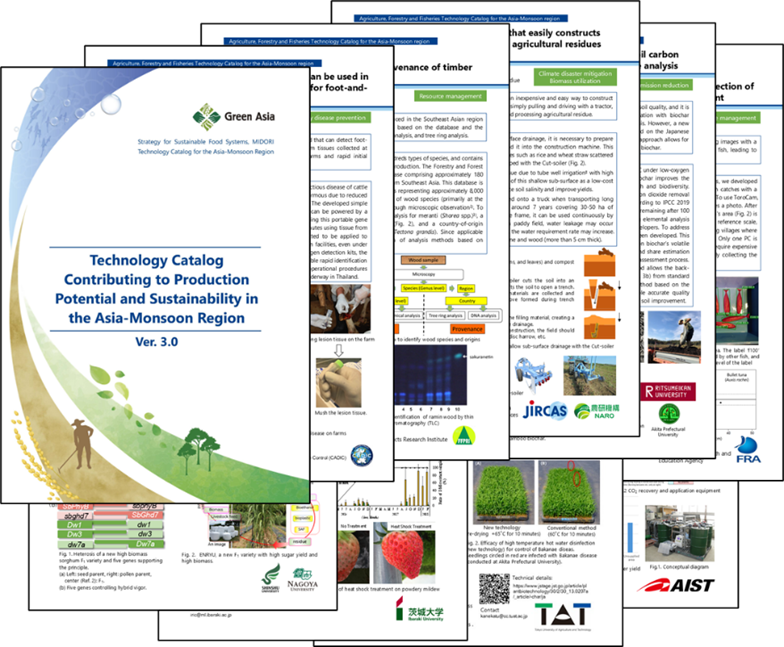Technology Catalog Contributing to Production Potential and Sustainability in the Asia-Monsoon Region, Ver. 3.0, Now Available
New technologies from the National Institute of Advanced Industrial Science and Technology and domestic universities added
2024-11-13
Technology Catalog Contributing to Production Potential and Sustainability in the Asia-Monsoon Region, Ver. 3.0, Now Available
-New technologies from the National Institute of Advanced Industrial Science and Technology and domestic universities added-
|
Key Points
|
Overview
On November 13, 2024, JIRCAS published Version 3.0 of the "Technology Catalog Contributing to Production Potential and Sustainability in the Asia-Monsoon Region" (hereafter referred to as the Technology Catalog) on its website.
Technology Catalog Ver. 3.0 has been expanded to include 40 technologies, with 9 new technologies added from AIST and Japanese universities (Ritsumeikan University, Akita Prefectural University Institute of Wood Technology, Nagoya University, Shinshu University, Tokyo University of Agriculture and Technology, Ibaraki University, and University of Miyazaki Center for Animal Disease Control).
The Technology Catalog is being developed primarily by JIRCAS as part of the "Green Asia Project," which is based on the Ministry of Agriculture, Forestry and Fisheries' Sustainable Food Systems Strategy “MIDORI”. Following the release of Ver. 1.0 in March 2023, Ver. 2.0 was published in September 2023, compiling 31 technologies from JIRCAS, NARO, FFPRI, and FRA that could contribute to areas such as greenhouse gas reduction and reduction of chemical fertilizers and pesticides.
Coinciding with the release of Ver. 3.0, the Technology Catalog web database now includes the names of participating institutions and countries for collaborative research, allowing for searches by country.
The Technology Catalog is intended for use by various stakeholders in the Asia-Monsoon region, including government officials, researchers, extension officers, farmers, foresters, fishers, and the private sector. By sharing these newly added technologies with each country and promoting their application and implementation, JIRCAS aims to advance the establishment of sustainable food systems in the Asia-Monsoon region.
Contact for Inquiries
- JIRCAS President : KOYAMA Osamu
Research Program Director- IIYAMA Miyuki (Information Program)
- Research Project Leader
- FUNAKI Yasuro (Director, Social Sciences Division / Project Leader)
- KOBAYASHI Shintaro (Senior Researcher, Social Sciences Division)
- Press Coordinator
- OMORI Keisuke (Head, Information and Public Relations Office)
Press e-mail: koho-jircas@ml.affrc.go.jp
- OMORI Keisuke (Head, Information and Public Relations Office)
Reference
Technology Catalog Ver. 3.0 URL (Published on November 13, 2024, 9:00 a.m.(JST))
Japanese:https://www.jircas.go.jp/ja/greenasia/techcatalog
English:https://www.jircas.go.jp/en/greenasia/techcatalog
※Website of the International Center for Strategy "MIDORI"
[List of technologies added in Ver. 3.0]
|
|
Technologies |
Institution |
|
1 |
National Institute of Advanced Industrial Science and Technology |
|
|
2 |
Ritsumeikan University |
|
|
3 |
A new F1 high-sugar, high-biomass sorghum variety “ENRYU” supports decarbonization efforts |
Shinshu University |
|
4 |
JIRCAS |
|
|
5 |
Controlling disease in paddy rice seeds using hot water disinfection combined with pre-drying |
Tokyo University of Agriculture and Technology |
|
6 |
Ibaraki University |
|
|
7 |
Nagoya University |
|
|
8 |
FRA |
|
|
9 |
Simple and rapid diagnostic technology that can be used in the field to enable early quarantine measures for foot-and-mouth disease | University of Miyazaki |









